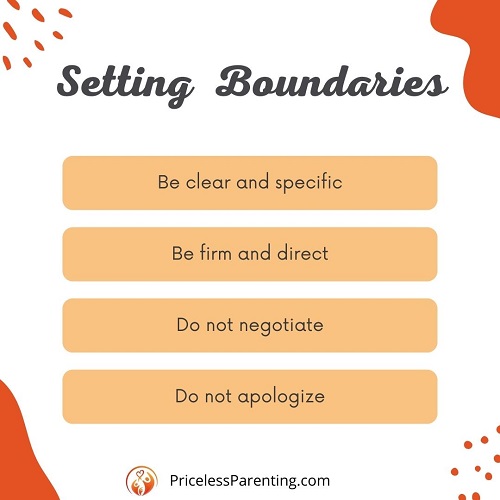Shunning Classmates Who Behave Poorly Versus Setting Boundaries
by Kathy Slattengren, M. Ed., Priceless Parenting (sign up for monthly parenting newsletter and receive 20+ printable charts for kids and parents)

There are kids in every class who struggle more than their peers to behave appropriately. In preschool these are the kids that turn to biting, pushing and hitting to communicate. By the time they are in grade school, their inappropriate behavior often leaves them isolated by their classmates.
There are many reasons kids may lag in developing interpersonal skills. It may be due to growing up in a traumatic environment, having sensory integration issues, being anxious or some other factors.
Kicking Out The Troublemaker Or Helping The Child Grow
A cooperative preschool in Seattle had a boy who regularly hurt other kids. In his article
“I Won’t Hurt You”,
Teacher Tom wrote about his school’s response to this boy and his family. He described “a five-year-old boy in class named ‘Jerry’ who had been diagnosed with sensory integration issues, the kind that caused him to at least once a day, often more, hurt classmates by pouncing on, hitting, or biting them. He was not ‘being mean’ and it was not done in anger, but rather as an act of pure, uncensored impulse.”
He overheard some boys planning to no longer play with Jerry. Their idea was to punish Jerry for his poor behavior by excluding him. While this is a natural consequence, Teacher Tom felt it “would result in a kind of cruelty that would do little more than to make a young, confused child even more confused.” It would not contribute to the kind, caring atmosphere he wanted to create in their classroom.
Parents in this cooperative preschool help in the classroom so they saw the problems with Jerry’s behavior. At a parent meeting, some parents brought up the idea of asking Jerry’s family to leave the school. Other parents declared they would also leave if Jerry’s family was asked to leave. Eventually they decided to work together to help Jerry.
How did they adjust their behavior to help Jerry improve his behavior?
- Parents talked to their kids about how Jerry struggled to control his behavior and that he wasn’t intentionally trying to harm them.
- Adults in the classroom stayed near Jerry so that they could intervene before he physically attacked someone.
- Some invited Jerry over for playdates so that he could deepen his friendships.
- Jerry’s parents had him working with an Occupational Therapist to improve his sensory issues.
- The kids learned to set boundaries with Jerry. For example, when Jerry asked to sit on a bench by a boy,
he responded “'Sure . . . If you don't hurt me.' And quite earnestly, Jerry answered, 'I won't hurt you.'”
When the parents and kids worked together, they were able to help Jerry become a successful member of the class. Expelling Jerry would have transferred the problem to some other school while also making Jerry and his family feel rejected. Jerry improved his interpersonal skills by practicing with kids who were caring enough to tolerate his failures until he achieved success.
Setting Stronger Boundaries
Children who behave poorly need others to provide clear, strong boundaries. However,
setting clear boundaries is not easy. Kids may need guidance in figuring out how to set more explicit boundaries.
The kids in Peter’s first grade class needed help in understanding his behavior and setting boundaries. Peter often spoke out of turn, grabbed things out of other kids’ hands and sometimes threw tantrums. The kids initially reacted by keeping their distance from Peter.
Although Peter was intellectually keeping up with his classmates, he was failing socially. Peter’s parents turned to Dr. Bruce Perry for help.
In his book
The Boy Who Was Raised as a Dog,
Dr. Perry explains that Peter spent his first three years in a Russian orphanage primarily in a crib prior to being adopted.
This early trauma and neglect led to parts of Peter’s brain being severely underdeveloped. He had missed the loving interactions babies need to establish their social brain connections.
Dr. Perry visited Peter's first grade class. He explained why Peter's brain was different than theirs and how they could help Peter. Once his classmates understood, they helped him instead of excluding him.
They helped Peter by setting more explicit boundaries perhaps like these:
- “You can sit by me if you don’t hit me.”
- “I’ll play tag as long as you won’t grab me or knock me down.”
- “You can use this marker I have if you first say please.”
- “It scares me when you yell. I will listen to you if you talk in a quieter voice.”
With the help of his classmates, Peter's social skills improved. These caring relationships were essential for Peter's healing.
Taking Action When Boundaries Are Crossed
Specifying boundaries up front allows everyone to get on the same page. If a child agrees to honor a boundary but then later breaks it, there are consequences.
For example, a high school science class had been given a large project. The teens could choose to work by themselves or with another student. Tyler asked Sam if they could work together. Sam was concerned because Tyler sometimes did not pull his weight on projects.
Sam agreed on the condition that Tyler would do at least half the work on the project. When Tyler failed to do his share, Sam got permission from the teacher to work independently on the project instead.
Being able to both set boundaries and enforce boundaries is an important life skill. When your kids know how to set boundaries, they have the skills to include classmates whose behavior they sometimes find challenging.
Schools are safer and more welcoming when everyone feels a sense of belonging.